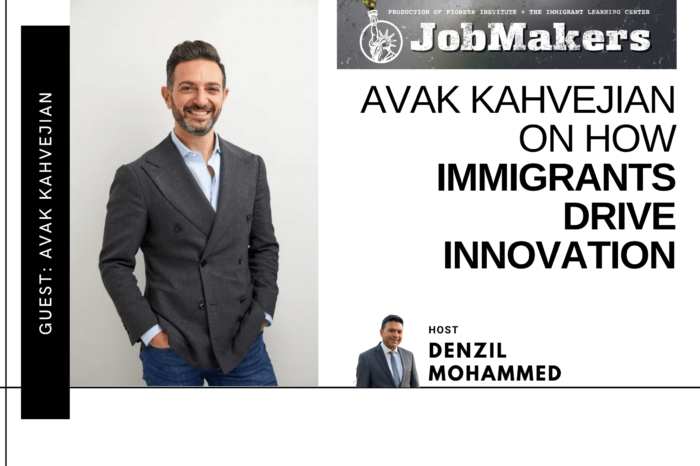Avak Kahvejian on How Immigrants Drive Innovation
/in Economic Opportunity, Featured, JobMakers /by Editorial Staff
This week on JobMakers, host Denzil Mohammed talks with Dr. Avak Kahvejian, an inventor, entrepreneur and CEO as well as general partner at Flagship Pioneering, a life sciences venture capital company in Cambridge, Massachusetts. For generations, his family was forced to flee from genocide in what was then Armenia (now eastern Turkey), to Syria, Lebanon, and then to Montreal, Canada, via the U.K., and finally, by choice, to Boston. His risk-taking, persistence, and ambition drove him to a place where people from all over the world come to innovate, ideate, and create: the United States. America has always attracted this kind of person, and that’s what has made it into the powerhouse it is today. As Avak cautions, if that well were to run dry, the result would be disastrous for all of us, as you’ll learn in this week’s JobMakers.
Guest
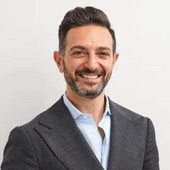 Avak Kahvejian, Ph.D. is a life sciences inventor, entrepreneur, and CEO. Since 2011, he has been a partner at Flagship Pioneering, where he leads a team to invent and launch new therapeutic platforms. His work has led to the creation of multiple high-value public and private companies including Seres Therapeutics; Rubius Therapeutics; Codiak BioSciences; Cygnal Therapeutics; Ring Therapeutice; Cellarity; Laronde; and Generate Biomedicines. Prior to Flagship, Avak was Vice President of Business Development at Helicos BioSciences, where he developed and commercialized the world’s first single molecule DNA sequencer. He serves on the board of the International Institute of New England, an institution which creates opportunities for refugees and immigrants to succeed through resettlement, education, career advancement and pathways to citizenship. From 2014 to 2020, he served on the board of the Canadian Entrepreneurs of New England, an organization dedicated to assisting Canadian entrepreneurs build ties with the Boston life sciences and technology ecosystems. Avak earned his Ph.D. and B.Sc. in Biochemistry from McGill University in Montreal, Canada.
Avak Kahvejian, Ph.D. is a life sciences inventor, entrepreneur, and CEO. Since 2011, he has been a partner at Flagship Pioneering, where he leads a team to invent and launch new therapeutic platforms. His work has led to the creation of multiple high-value public and private companies including Seres Therapeutics; Rubius Therapeutics; Codiak BioSciences; Cygnal Therapeutics; Ring Therapeutice; Cellarity; Laronde; and Generate Biomedicines. Prior to Flagship, Avak was Vice President of Business Development at Helicos BioSciences, where he developed and commercialized the world’s first single molecule DNA sequencer. He serves on the board of the International Institute of New England, an institution which creates opportunities for refugees and immigrants to succeed through resettlement, education, career advancement and pathways to citizenship. From 2014 to 2020, he served on the board of the Canadian Entrepreneurs of New England, an organization dedicated to assisting Canadian entrepreneurs build ties with the Boston life sciences and technology ecosystems. Avak earned his Ph.D. and B.Sc. in Biochemistry from McGill University in Montreal, Canada.
Get new episodes of JobMakers in your inbox!
Read a Transcript of This Episode
Please excuse typos.
Denzil Mohammed:
I’m Denzil Mohammed. Welcome to Jobmakers.
Denzil Mohammed:
The kinds of people who choose to migrate are typically a special kind of people, risk taking ambitious determined for those who are forced to migrate. These qualities are really forced upon them as they have no choice, but take the risk to make something of themselves, what results you can find in countries like the United States, Canada and Germany, places where people migrate to robust economies, hubs of innovation, inherently entrepreneurial for Dr. Avak Kahvejian, an inventor, entrepreneur and CEO, as well as general partner at flagship pioneering, a life sciences venture capital company, based in Cambridge, Massachusetts, he’s seen both types of migration and both kinds of risk taking success for generations. He Armenian family was forced to move from what was then Armenia now, Eastern Turkey to Syria, to flee genocide then to Lebanon, then to Montreal Canada, by the UK fleeing civil war. And finally, by choice to Boston, that risk taking persistence and ambition drove him to a place where people from all over the world could come to innovate, ideate and create the United States. This country has always attracted this kind of person making it into the powerhouse it is today. And so of our cautions, if that well were to run dry, the result would be disastrous for all of us. As you learn in this week’s Jobmakers. Avak Kahvejian,
Denzil Mohammed:
A general partner at Flagship Pioneering, welcome to the Jobmakers podcast. How are you?
Avak Kahvejian:
Good, thank you for having me.
Denzil Mohammed:
So tell me a little bit about the work that you do.
Avak Kahvejian:
Well, I work at Flagship Pioneering, which is a company creation firm. It’s an innovation firm and we focus primarily on the life sciences in terms of making new biotechnology companies that are going to develop new therapies or new solutions for sustainability. Whether that’s in the nutrition space or the agricultural space. I lead a team here at, at Flagship that is mandated to I idea and invent new platform technologies. And those platform technologies become the basis for a new, and they develop products over time. And I’ve been doing this now for 10 years.
Denzil Mohammed:
So give us a sense of some of the companies that you’ve helped bring to market.
Avak Kahvejian:
So they are quite diverse. Over the years, I’ve had the pleasure and honor of working on some really cool companies. Some that your audience may know, and some of course, that they will, they’ve never heard of. The, one of the first projects that I got involved with was Moderna. And as now you all know they ended up creating one of the best and, and only vaccines for the, the coronavirus. So that’s one example of a platform technology, meaning a technology that can be used for many, many different things, having the ability in one company to design it, to make it, to apply it, and then to think about different ways of using it is really the model. It’s the archetype of, of what we do. And these are more, more or less chronological is Rubus a company that had the, to make red blood cells in a lab.
Avak Kahvejian:
So kind of like in a factory and to make them therapeutic, to make them medicinal. And so how can you grow artificial quote, unquote, blood in a, in a, in a VAT, but also endow the blood with the therapeutic properties. And you can imagine there’s a range of things you can do with that. And they have trials now for combating cancer. And those trials are, are, are really underway as we speak and a variety of other companies of that ilk, new gene therapies, new nucleic acid therapies like, like Moderna and and, and new discovery platforms that are going to generate the next wave of, of medicinal products.
Denzil Mohammed:
That is absolutely remarkable. And might I add that the, the teams that you’re talking about that form, these companies are extremely diverse and you’re an immigrant from Canada and they’re immigrants all around in this space. You’ve also been active in the nonprofit space, the Canadian entrepreneurs in new of new England, the St. Stephens Armenian elementary school. And much of this clearly is connected to your family’s history of migration. Can you walk us through your family’s journey, starting with your at grandparents?
Avak Kahvejian:
Yeah, so I don’t have all the dates on hand, but in, during the, the genocide that the Turks perpetrated against the Armenians in 1915, my family was very well established in the Western Armenia or what is known as Eastern Turkey in a town called now I think it’s called Sanliurfa, and they were a prominent family there owned a lot of property and, and farmland and during the genocide they had to escape the, the, in, during the, the genocide, the, the mandate was for the Turkish army to either either kill or forced migrate Armenians out of those territories. But what happened was it caused a dispersion of Armenians across the world. My family didn’t go very far. They went to Syria and established themselves there. And then from Syria migrated to Beirut Lebanon and Beirut as you may know, was a, was a microcosm of many, many different cultures and religions, some very extreme differences in terms of Christianity and Islam, all coexisting together. And my parents were born in Beru and I was born in Beru. I had the unfortunate luck, I guess, of being born at the beginning of the civil war there where things started to really fall apart. And that was in 1975, practically carrying me out in a hand basket. We, we moved to London, England, and then as a stopover, and then eventually to Montreal Canada to, to establish ourselves there.
Denzil Mohammed:
And then you ended up here, luckily not by by force, but by choice for the first time in your family’s history. I mean, that’s absolutely remarkable. And these are the stories that, that, you know, people on the street American go, Americans just don’t know that that fall behind you as an entrepreneur, you as an immigrant. So I saw a video of you on YouTube, where you said an immigrant and an entrepreneur are very much the same. Can you explain that to our American audience?
Avak Kahvejian:
Well, yeah, I think there are, are elements of, of starting a company, having an idea, building that company that are very much akin to moving to a new land and trying to essentially find oneself and establish oneself in, in, in that new land. And so as think those are the, those, those experiences both have similarities in what they do to your mind and what they do to your emotions. Just think of yourself as you travel, even as a tourist to another country and the heightened sense of awareness you have from the moment you, you step off the plane is very different from that the sense of heightened awareness you have when you’re walking down the street in your own neighborhood. And, and, and that’s very much kind of the beginning of the entrepreneurial journey. You’re putting yourself in a situation where you need to figure things out.
Avak Kahvejian:
You need to understand who’s who what’s what, and you need to figure out what your next steps are to move forward. That’s, that’s very, very similar to what an immigrant experiences when they come to a new land, now, let alone doing it when you are under duress, let alone doing it when you are doing it by force, as you said, and not necessarily by choice the heightened sense of the heightened sense of awareness and the heightened sense of urgency, you have to survive and thrive. Assimilation involves not simply melting into the, the, the broader hole, which is how we often look at it like, oh, you have to assimilate into this new society. Well, it’s not, it’s not exactly the right definition for the word. If I look up the definition, it says, number one, under assimilation is take in information, ideas, or culture and understand it fully.
Avak Kahvejian:
So that’s actually the, the subject is you taking in the information and understanding it fully. So I think an entrepreneur does exactly that when they first set out to do stuff is figure out situation that their company is trying to disrupt the, the environment that their company’s going to operate in. They need to be consummate learners, a simulators of information and integrators of information, not simply melt in to the status quo, but they need to take it in and understand it so that then they can act on it. And I think that’s exactly what an immigrant has to do. They don’t necessarily simply have to lose their identity and melt into it, but they need to take in the, they need to take in the information and the culture around them and understand it fully.
Denzil Mohammed:
And, and there’s no safety net, right? It’s a risk. And you, you just have, you have, have no choice, but to just forge ahead with it, whether you, you succeed or fail that’s a very, very interesting way of putting that comparison. So 17 years ago, you were that immigrant moving to the Boston area from Montreal, fresh out of your PhD program at McGilI. Did you feel welcomed in the biotech ecosystem here? You know, obviously coming from a country like Canada, which is extremely diverse and depends on immigration, what did you think of the diversity here? Did it, did it help the ecosystem?
Avak Kahvejian:
The, the, the biotech ecosystem here is actually one of the most diverse industries probably that, that I’ve ever seen and it’s become not only an epicenter in the United States, it’s an epicenter for the world and maybe the epicenter for the world. So you have if you see it like a country, it’s a country in and of itself, that is attracting a lot of immigrants. The biotech community here is, and also has, embassies almost, I would call them where companies where countries have actually sent emissaries here to learn about the ecosystem and have a permanent presence here.
Denzil Mohammed:
The second part of that question is that diversity important. And did, does that help the ecosystem?
Avak Kahvejian:
Definitely. most definitely. Now, obviously there, it, it, there’s some uniformity to it in that world. We’re kind of a worldwide community or worldwide tribe of scientists. So many, many of the people coming here come with, again, advanced degrees in, in the Biosciences and have been trained by top academic institutions throughout the world. But at the same time, everyone’s coming with a diverse training with diverse background and bringing new perspectives to, to, to tackling the, the big challenges that we’re trying to tackle. These are not easy problems to, to solve. These are not simply building something in a very predetermined way, in a very a predictable way. There is a lot of uncertainty to what we do in every single endeavor in biotech, virtually every single one. There’s a lot of serendipity involved. A lot of problem solving required a lot of creativity and ingenuity required perpetually and without diverse opinions, diverse backgrounds, interdisciplinary problem solving, we wouldn’t achieve half of what we we achieve. So definitely we need, we need, we need the world applied to, to, to these problems, not just a small group of people or a small group of uniform people to tackle them.
Denzil Mohammed:
And the proof is literally all around you in Cambridge, Moderna, Pfizer companies that are founded by people from all over the place, including the United States. And we have these vaccines. We have these therapeutics, we have, we are advancing our technologies. The data show clearly that immigrants are more likely to study and work in stem. This is just, this is just how it is. And therefore, you know, there’s a great value of H1B, foreign trained workers in the us who are in the stem in stem industries. If you were to give us a suggestion, like, what do you think should be done in the us to address the shortage of American stem workers?
Avak Kahvejian:
We definitely need to make it easier for scientists to come here and to work here because it, it, it can only enrich the intellectual diversity. It can only accelerate the advancement of knowledge and and innovation that we are, are really striving for. And, and as we saw with the pandemic innovation invention and, and advanced advanced technologies are what’s going to help human man overcome major challenges. And, and we can’t sit still. So we’ve experienced the difficulty in bringing scientists from other other countries, even though they have advanced degrees, even though they’ve even demonstrated an and a willingness to come here and contribute. And I, and those barriers have to be those barriers have to come down for sure,
Denzil Mohammed:
In a recent episode of this podcast, I was talking to a son of Dominican immigrants who started a cybersecurity firm. And he said there are 600,000 job openings in, in this field going forward. I mean, that’s just staggering. So I’m bringing it back to something that we mentioned earlier, which is your nonprofit involvement. You’ve stood on the boards of several, including the Armenian schooling Watertown. Now you’re chairman of the board of the international Institute of new England. For those of you who don’t know the international Institute, resettles refugees and creates opportunities for immigrants and refugees to succeed through career advancement pathways to citizenship, et cetera. Why is this work important to you?
Avak Kahvejian:
Well, as, as an immigrant and an immigrant, who’s had it easy. I think I’ve always wanted to figure out a way to give back to to, to immigrants. And, and as we call them new Americans, how do we, how do we help new Americans make a life for themself here? Especially some of those who have not been as fortunate as I have been to land here willingly and to lend here with a, an existing safety net or an existing lending pad. And, and so that’s been really my motivation for, for doing that. Now, again, I play a really small part in the, at the I E as, as chairman of the board, we have really an, an amazing team of people there who, who do everything from the minute someone lands here, a refugee lands here in the United States to finding them housing, helping them get a job, helping them learn the language and to situate themselves, filling their pantries.
Avak Kahvejian:
So they have food and, and, and clothing that work is, is, is a Herculean task and only is only the beginning O of the journey. And so far it’s been, it’s been quite heartwarming and, and amazing to see the outpouring of support we’ve gotten from, from individual donors, from corporate sponsors. And in particular, some of the, the, the, the pillars of industry here in Boston namely the biotech community, the tech community, and the financial services I think especially the biotech community, they appreciate how diversity matters, how it impacts society and how it impacts their business. And they’ve been very generous and, and long term support for what we do.
Denzil Mohammed:
And might I just add refugees come from, not the places that the biggest immigrants sending countries come from, and they’re all over the place, Burma sorry, Myanmar Iraq, Afghanistan the Congo Sudan all these even Ukraine. And so it’s a, it’s a much more difficult task when you have to cater to such culturally linguistically socially different populations. So you talked about new Americans and the idea of the international Institute of course, is to welcome and sustain these families reflecting on your own story and the work that you’ve been doing, explain to audience why the idea of welcoming or being a welcoming or inclusive country is important.
Avak Kahvejian:
Well, if you reflect back on the history of the United States and the history of Canada for that matter, I think what, what makes north America so special? And I think what has one of the things that has contributed to the tremendous amount of success and growth and, and peace and prosperity that we’ve, we’ve benefited from here is that notion of welcoming and including and recruiting people from throughout the world to making, to making, to creating these societies, building these economies. And I, I, I see it firsthand. I felt it firsthand. I see it firsthand, not only in my own experience, but in, in my, in my everyday work as an entrepreneur. And I see it from a historical perspective the, the waves of immigrants and the injection of new ideas, new cultures, new products these things have come from a lot of it have come from the outside and have, have been given the fertile ground here to, to, to flourish.
Avak Kahvejian:
And so I think it’s that amazing alchemy and combination that makes, makes, makes these, these countries so special. And we don’t want to lose that. I, I think there, there is something that we shouldn’t take for granted and that if we do turn off the spigot or constrain it significantly, I think we might not feel it in the near term. People might complain that they don’t have enough workers for particular jobs, et cetera, but I think in the long term, it’ll be even more, more dramatic, more drastic. The impacts will be, will be multi-generational. And, and we have to be mindful of that. So I, I, I, I think we, we should celebrate what, what we’ve accomplished here over, over the, the, the centuries and, and over the last few decades. But there’s obviously more work to do and more opportunity and I’m really glad to be part of it.
Denzil Mohammed:
And again, the proof is all around us. Look at our economy. We’re the biggest economy in the world because we have this constant injection of entrepreneurship and persistence and ideation. And that goes hand in hand with, with welcoming people Avak Kahvejian, general partner at Flagship Pioneering and immigrant from Canada. Thank you so much for joining us on JobMakers.
Avak Kahvejian:
Thank you. It, it was a pleasure. And an honor
Denzil Mohammed:
Jobmakers is a weekly podcast about immigrant entrepreneurship and contribution produced by Pioneer Institute, a think tank in Boston and the Immigrant Learning Center in Malden, Massachusetts, a not-for-profit that gives immigrants a voice. Thanks for joining us for this week’s incredible story of immigrant entrepreneurship. Remember, you can subscribe to Jobmakers and apple podcast, Spotify over wherever you get your podcasts. And please leave us a review. I’m Denzil Mohammed. See you next Thursday at noon for another JobMakers.
Recent Episodes:

Mahmud Jafri Builds on a Pakistani Legacy in America
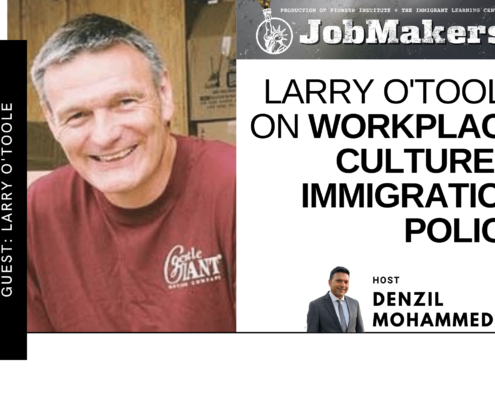
Larry O’Toole on Workplace Culture & Immigration Policy

Amar Sawhney on Sikhs, STEM & COVID
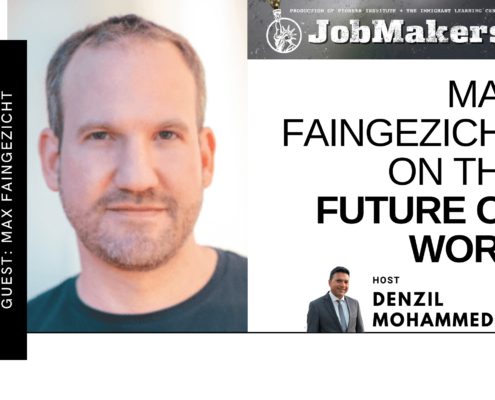
Max Faingezicht on the Skills Gap & the Future of Work
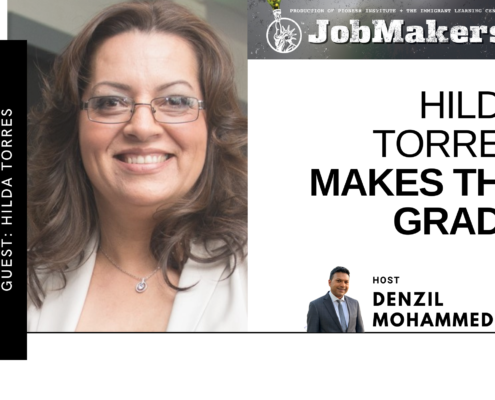
Hilda Torres Makes the Grade
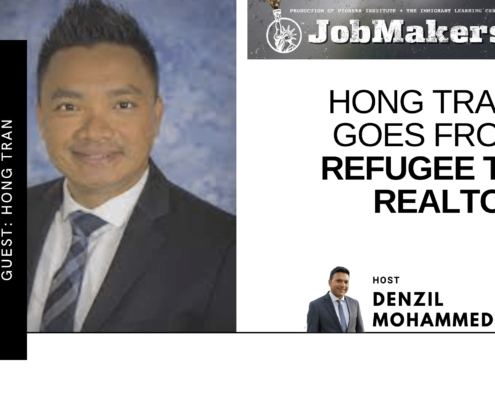
Hong Tran Goes from Refugee to Realtor
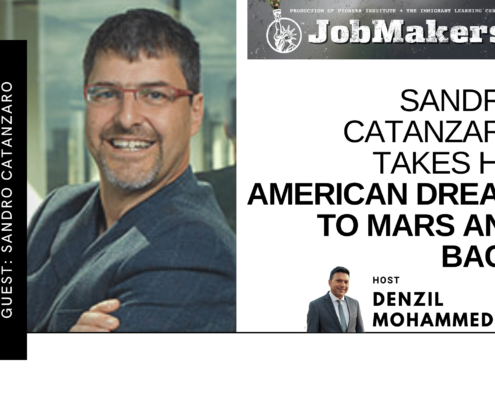
Sandro Catanzaro Takes His American Dream to Mars and Back
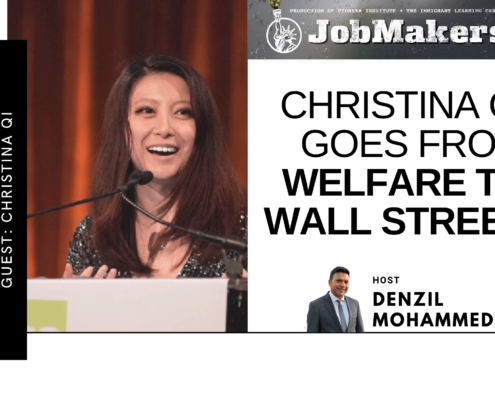
Christina Qi Goes From Welfare to Wall Street

